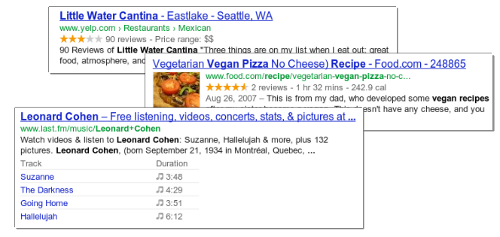Many factors have been added to the way that Google’s algorithm understands and displays your content, your site, and your overall online authority.
Google Authorship was one such factor. What it created was a way to link the content you created with your Google+ profile. It intended to give your content not only an identifiable author for search engines, but for searchers too, in addition to an extra bit of attention as author names and images were then displayed next to that piece of content in the search results.
Now, however, the era of Google Authorship has ended.
This month, Google announced in a blog post that Google Authorship will no longer be impacting search results as it has in the past. The search engine has removed Authorship from the search results and it has taken it out of their webmaster tools as well. Three years after it first appeared, seems it’s time to say goodbye to the rel=author markup.
What’s the Difference Between Authorship and Author Rank?
While Authorship itself may be dead, Author Rank is still very much alive.
With the death of Authorship came the end of an author’s image and information being displayed next their content in Google’s results. Author Rank, however, is a very different beast entirely. And Author Rank–where Google knows who actually authored a certain piece of content a story–most definitely still matters.
That means that all the work you put into claiming your work and enhancing your Google+ profile weren’t entirely for nothing. Having an engaging Google+ page has benefits outside of Authorship, just like each engagement on any social platform across the board has its own benefits. And ensuring Google knows who’s responsible for what content, is still important–especially if you’re a trustworthy source with a lot of online authority.
What Should You Be Doing Now?
If Authorship isn’t impacting how your content’s appearing in the search results anymore though, then what is? And what should you be doing in its place to help get your content the exposure it deserves?
Here’s what you need to know. Continue to make sure any content you put out around the web is linked back to you (and your business). Also continue to use and optimize your Google+ listing–both of these steps can still help your marketing and your brand all the way around, even without Authorship. Now though, as the focus shifts away from Authorship, be aware of where that focus is being directed: Rich Snippets.

Without Authorship markup, Google is increasing the emphasis on rich snippets–the short bit of text that appears under every search results. Using rich snippet microdata helps Google recognize, rank, and display your content. Whether its a person, a product, a recipe, a business, a video or an event, Rich Snippets allow webmasters to impact the way Google understands and displays your content. Rich Snippets, much like Authorship, allows you to add a visual element to when your content is shown in Google’s results. Visible star ratings, recipe images, and more can give your content an added edge over the other search results.
What the end of Authorship and the rise of Rich Snippets reveals is something we all already know: that the search engine’s algorithm is far from static.
All of this shows that nothing Google creates is guaranteed to be kept, unless it serves to enhance their ability to provide the best results possible to their searchers. Unfortunately, as many webmasters failed to adopt authorship markup and many users didn’t seem overwhelmingly impacted one way or another, the Authorship